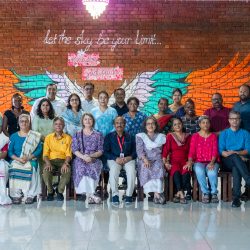Health for Older People
 When our team goes out on home visits, every single day we are confronted by the plight of the elderly in our society. Globalization and nuclear family system having destroyed the support system that existed in the last generation, the elderly are too often left with no one to attend to their health or their well being.
When our team goes out on home visits, every single day we are confronted by the plight of the elderly in our society. Globalization and nuclear family system having destroyed the support system that existed in the last generation, the elderly are too often left with no one to attend to their health or their well being.The problem of course is not specific to India, but holds true for most of low and middle income countries. Mr Diederik Lohman of Human Rights Watch writes to inform us about the call for action by Navanetham Pillay, UN high commissioner on human rights who specifically refers to the need for palliative care for older persons.
Governments Must Make Health Of Older People A Priority, Says Un Rights Chief – New York, Sep 16 2011
With the number of people aged over 60 expected to reach 2 billion by 2050, or more than a fifth of the total global population, discrimination against old persons should rank among the most pressing policy issues for governments and societies, the United Nations human rights chief said today.
“Regrettably, prejudice against and stigmatization of older persons [known as ageism] are consistently reported everywhere in the world,” High Commissioner for Human Rights Navi Pillay told the UN Human Rights Council’s panel on the right to health of older persons, citing discrimination based on age in areas as vital as social protection policies, employment laws, and access to public services.
“Its intimate link with the right to health has particular relevance. Health lies at the heart of all human rights issues when we age. Research shows that health tops older persons’ issues of concern. Problems such as lack of adequate diagnosis or treatment, lack of trained staff or home-based services, or difficulties to access reliable health information are often cited.”
She cited a report on ageing by Secretary-General Ban Ki-moon to the General Assembly highlighting the fact that age often defines whether someone is allowed access to medicines, treatment, devices or long-term care. Many older people say that their age alone is handled as a disease and that they are often dismissed without proper diagnosis.
Ms. Pillay underscored the lack of adequate services, facilities and care, or their prohibitive costs, with estimates showing that only one in five persons aged 60 or more has a pension. Without a pension, older persons may well be confronted with poverty, while stress about the affordability of health services leads to or is compounded by unattended chronic diseases, malnutrition and lower standards of living, she noted.
“A social protection system is crucial, and States are required to allocate sufficient resources and facilities to cope with these demands now and to prepare for the future. The unique requirements of older persons must be incorporated in national health systems, especially in low- and middle-income countries.”
She said tackling the lack of specialized services such as residential centres, home care programmes and geriatric services, age-friendly primary health care, and palliative care must be a priority.
“Adequate access to palliative care is essential to ensure that these people can live, and ultimately die, with dignity,” she declared.





